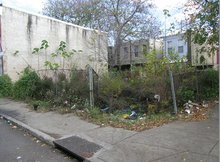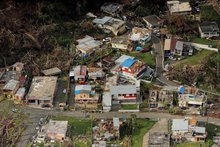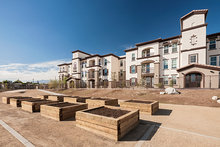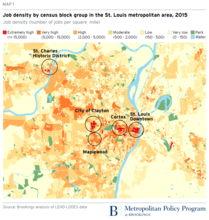Found 110 resources.
0
0
0
Many are wondering how engaged President Trump actually is on one of his campaign issues: revitalizing the nation’s crumbling infrastructure. Eyes are turning back to Congress for a broad infrastructure package. Yet there is an even bigger issue of the looming insolvency of the Highway Trust Fund. BPC’s Jake Varn is joined by former Reps. Bill Shuster (R-PA) and Joe Crowley(D-NY) to discuss these issues.
Topics: Community development, Funding, Housing, Legislation & Policy, Transportation
0
0
0

A new study measured the mental health of Philadelphia residents before and after blighted lots had been converted into green spaces.
Topics: Community development, Health, Mental health, Place-based, Research
 Shared by Housing Is
on Mar 11, 2019
Shared by Housing Is
on Mar 11, 2019 0
0
0

The housing crisis has given rise to acronyms which define the battle over new developments: "Yes in My Backyard" (YIMBYs) vs. “Not In My Backyard" (NIMBYs). And now there's a new acronym: PHIMBY, as in "Public Housing in My Backyard."
Topics: Community development, Housing, Legislation & Policy, West Coast
 Shared by Housing Is
on Mar 11, 2019
Shared by Housing Is
on Mar 11, 2019 0
0
0

The gas tax hasn’t budged since 1992, and highway trust fund is running on fumes. Could a Green New Deal pushed by Congress be a fix?
Topics: Community development, Funding, Housing, Legislation & Policy, Transportation
0
0
0
The development of new digital telecommunications capabilities combined with a persistent digital divide leaves the public sector with enormous responsibilities to promote network quality and deliver equitable access—but it can only do so by sensibly splitting regulatory responsibilities between the national and local levels. Unfortunately, news out of Washington, D.C. reveals the federal government has overstepped its appropriate role, constricting local governments’ abilities to craft locally tailored solutions.
Topics: Broadband, Community development, Legislation & Policy, Low-income
0
0
0
So, are the stars better aligned for an infrastructure bill this year? Unfortunately, rhetoric only goes so far, and Washington continues to suffer from the same elemental failure as it did in 2017—the U.S. lacks a clear infrastructure vision. Only when Congress is ready to truly debate what objectives the federal government hopes to achieve—and how to invest to advance those goals—can we begin to craft a transformative national strategy.
Topics: Community development, Funding, Housing, Legislation & Policy, Transportation
 Shared by Housing Is
on Feb 28, 2019
Shared by Housing Is
on Feb 28, 2019 0
0
0
Zoning, a topic usually buried in the real estate sections of local newspapers or debated at community planning meetings, has recently taken the national stage. Zoning figures prominently in the debates over the value that Amazon HQ2 will deliver to Arlington, Virginia, and New York City, while coverage of the affordable housing crisis in states like California blames local zoning restrictions. Cities like Minneapolis, which is radically rewriting its zoning codes, are being hailed as national models.
Topics: Community development, Housing, Legislation & Policy, Research
 Shared by Housing Is
on Feb 14, 2019
Shared by Housing Is
on Feb 14, 2019 0
0
0
Local officials, impact investors, and philanthropy have important roles to play in helping communities access Opportunity Zone financing that benefits current residents, especially those with low or moderate incomes. Using Chicago and Cook County as a case study, we identify steps these actors can take to attract helpful, and limit harmful, investments. We find that the Opportunity Zones selected in Chicago and Cook County broadly fulfilled the incentive’s spirit, targeting areas that were more economically distressed. Going forward, it will be necessary to leverage available policy and...
Topics: Community development, Funding, Housing, Legislation & Policy, Midwest, Place-based, Research
 Shared by Housing Is
on Feb 14, 2019
Shared by Housing Is
on Feb 14, 2019 0
0
0
Central Ohio’s suburbs have become a target of affordable housing efforts. With the region’s rising housing costs straining people everywhere, developers, advocates and some city leaders are increasingly calling attention to the need for affordable housing to be built in places where it historically hasn’t been.
Topics: Community development, Housing, Midwest
0
0
0
Research suggests that living in concentrated poverty is harmful to health, well-being, and economic mobility. Inclusionary zoning can break up poverty density by imposing legal requirements to create affordable housing across neighborhoods. In Montgomery County, Maryland, inclusionary zoning laws require developers to set aside 12 to 15 percent of new homes at below-market rates and allow the public housing authority to purchase a portion of these units. As a result, two-thirds of public housing residents in Montgomery County live in economically diverse, low-poverty neighborhoods. To assess...
Topics: Community development, Housing, Mental health, Place-based, Research
 Shared by Housing Is
on Feb 7, 2019
Shared by Housing Is
on Feb 7, 2019 0
0
0

The U.S. territory needs to urgently tackle issues such as "widespread informal housing" and "the exorbitant amount of abandoned spaces" as it rebuilds after Hurricane Maria.
Topics: Community development, Food insecurity, Funding, Homelessness, Housing, Legislation & Policy, Nutrition, Safety, Stability, U.S. Territories
 Shared by Housing Is
on Feb 4, 2019
Shared by Housing Is
on Feb 4, 2019 0
1
1

At a recent public meeting, Sandra Lee Fewer, a member of the city’s Board of Supervisors, asked acting librarian Michael Lambert to explore whether future library renovations might include affordable housing. Fewer hopes to leverage existing public land to create multi-story facilities that include both libraries and housing.
Topics: Community development, Homelessness, Housing, Literacy, Low-income, Partnerships, Place-based, Research, Youth
 Shared by Housing Is
on Jan 29, 2019
Shared by Housing Is
on Jan 29, 2019 0
0
0
A new collaboration of San Francisco Bay Area foundations and businesses is raising $540 million to tackle the region’s affordable housing crisis.
Topics: Community development, Health, Housing, Low-income, Partnerships, Supportive housing, West Coast
 Shared by Housing Is
on Jan 28, 2019
Shared by Housing Is
on Jan 28, 2019 0
0
0
Mayors from across the country believe that high housing costs and a lack of well-paying jobs are keeping more people from climbing the social ladder in their cities.
Topics: Community development, Housing, Legislation & Policy
 Shared by Housing Is
on Jan 24, 2019
Shared by Housing Is
on Jan 24, 2019 0
0
0

When plans to develop affordable housing units in San Bernadino hit a funding roadblock, Dignity Health committed a $1.2 million bridge loan to help fill the gap. But the health system didn't stop there.
Topics: Community development, Funding, Health, Housing, Low-income, Partnerships
0
0
0

Island School is one of 247 “community schools” in New York. These are regular public schools, with a twist. They have longer days and longer school years: Island stays open 12 hours a day, six days a week, including spring and winter breaks as well as the summer. A psychologist makes weekly rounds. A dentist comes by regularly. So does an optometrist, and students who need glasses get them free.
Topics: Community development, Dual-generation, East Coast, Education, Family engagement, Homelessness, Housing, Low-income, Mental health, Metrics, Partnerships, Stability, Youth
0
0
0
Communities can leverage local housing and neighborhood policies to address gun violence through tools such as demolition, vacant property maintenance and reuse, foreclosure mitigation counseling, homeownership support programs, code enforcement, and zoning.
Topics: Community development, Housing, Partnerships, Place-based, Safety
 Shared by Housing Is
on Dec 20, 2018
Shared by Housing Is
on Dec 20, 2018 0
0
0

President Trump directed federal agencies on Wednesday to steer spending toward certain distressed communities across the country — part of his administration’s push to turn a tax break included in last year’s $1.5 trillion tax package into a broader effort to combat poverty and geographic inequality.
Topics: Community development, Funding, Legislation & Policy, Low-income, Place-based
0
0
0
This report is intended as a practical tool for those seeking to understand how capital does and does not flow to communities, businesses, and households. This can inform efforts by community developers to identify projects in need of financing, raise capital, and design and market new financial products and services. We provide a concise how-to guide across five approaches to assessing community need, a four-step process to study capital flows, and eleven approaches to determining capital gaps. To help ground this, we provide examples drawing from original data about the Twin Cities of...
Topics: Asset building, Community development, Midwest, Stability
0
0
0
The 2018 Purpose Built Conference in Orlando, Florida from October 24 – 26 was a tremendous opportunity for thoughtful engagement and energetic conversations with Network Members and attendees from all across the country. Our panel of guest speakers represented a wide range of industries and brought unique perspectives and insights.
Topics: Community development, Education, Health, Housing, Low-income, Mobility, Partnerships, Place-based
0
0
0

In collaboration with Project for Public Spaces (PPS), the National Main Street Center (NMSC), and others, the Bass Center will examine the place needs of people and businesses and use that knowledge to help public, private, and civic sectors leaders develop new approaches to creating and supporting concentrations of economic activity that drive inclusive economic growth. The Center is premised on the idea that these “economic districts” represent the geographies in which leaders can have the most transformative impact—where they can build local trust and understanding, experiment safely,...
Topics: Community development, Low-income, Mobility, Partnerships, Place-based
0
0
0
The Tax Cuts and Jobs Act of 2017 provides a new incentive—centered around the deferral, reduction, and elimination of capital gains taxes—to spur private investments in low-income areas designated by states as Opportunity Zones. This provision is based heavily on the Investing in Opportunity Act (S. 1639) introduced by Senator Cory Booker (D-NJ) and Senator Tim Scott (R-SC). Given the significant interest among investors, it is possible that this new tax incentive could attract hundreds of billions of dollars in private capital, making this one of the largest economic development initiatives...
Topics: Community development, Funding, Legislation & Policy, Mobility, Place-based
0
0
0
With political divisions on the rise and global cooperation imperiled, city officials worldwide are stepping up to lead, solving local problems while sharing solutions and innovations across borders. Making cities such as New York, Pittsburgh, and Los Angeles inclusive, safe, and sustainable is vital to the future of the United States—and the globe. Driven by the need to act locally while thinking globally, a growing number of metro areas are adapting the Sustainable Development Goals (SDGs) as a blueprint for progress.
Topics: Community development, Housing, Partnerships, Place-based, Sustainability
0
0
0
The city and county of Durham, GoTriangle and the Durham Housing Authority are committed to enhancing opportunities for existing low-income families as well as to increasing the production of affordable housing. The light-rail project is critical to the success of these goals, and the success of these goals is critical to the light-rail project.
Topics: Community development, Funding, Housing, Legislation & Policy, Low-income, Partnerships, South, Stability, Transportation
0
0
0
After decades of sprawl and suburban dominance, U.S. cities are experiencing rebounding populations, growing employment, and new public and private sector investments in places that are walkable, transit-oriented, and support diverse people and amenities. But we know that the benefits of these trends are not equally distributed, presenting an urgent opportunity for local and regional leaders to advance place-led development that produces better economic outcomes for more people in more places.
To help deliver on that imperative, the Metropolitan Policy Program at Brookings launched the...
Topics: Community development, Housing, Partnerships, Place-based, Safety, Stability
